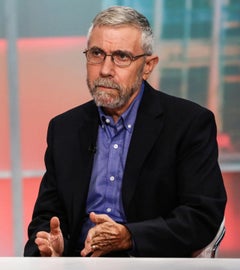MI SELECCIÓN DE NOTICIAS
Noticias personalizadas, de acuerdo a sus temas de interés

The economist Brad DeLong put up an excellent presentation on his blog about the sad history of belief in the confidence fairy and its dire effects on policy. One of his themes is the bad behavior of quite a few professional economists, who invented new doctrines on the fly to justify their opposition to stimulus and their desire for austerity even in the face of zero interest rates and a depression. One quibble: I don’t think that Mr. DeLong makes it clear just how bad the claim about government spending crowding out private investment, even at the zero lower bound, really was.
Anyway, two items crossed my virtual desk recently that reinforced the point about just how badly some of my economist colleagues continue to deal with fiscal policy issues.
First, Gregory Mankiw published a piece in The New York Times that mentioned a study by the economists Alberto Alesina and Silvia Ardagna about expansionary austerity without mentioning any of the multiple other studies that refuted their results. And wait, there’s more. As Matt O’Brien at The Washington Post noted, Mr. Mankiw also cited a 2002 paper written by Olivier Blanchard and Roberto Perotti that was skeptical about fiscal stimulus while somehow not mentioning the famous 2013 paper by Mr. Blanchard and Daniel Leigh that showed that multipliers are much bigger than the International Monetary Fund thought.
Second, I read a note from David Folkerts-Landau of Deutsche Bank that denounced the European Central Bank for its easy-money policies, because “by appointing itself the eurozone’s ‘whatever it takes’ savior of last resort, the E.C.B. has allowed politicians to sit on their hands with regard to growth-enhancing reforms and necessary fiscal consolidation. Thereby E.C.B. policy is threatening the European project as a whole for the sake of short-term financial stability. The longer policy prevents the necessary catharsis, the more it contributes to the growth of populist or extremist politics.”
Yep. That “catharsis” worked really well when Chancellor Heinrich Brüning did it in Weimar Germany, didn’t it?
What strikes me is the contrast with the 1970s. Back then, the experience of stagflation led to a dramatic revision of both macroeconomics and policy doctrine. This time, far worse economic events, and predictions by economists far more at odds with experience than the mistakes of Keynesians in the past, seem to have produced no concessions whatsoever.
============Pie. CREDITO FOTO (26285592)============
CHARLIE MAHONEY/THE NEW YORK TIMES
Gregory Mankiw, a Harvard economics professor, with Janet Yellen, the Federal Reserve chairwoman, in Cambridge, Mass., in May.
La informalidad y la extracción ilícita de minerales amenazan tanto a la biodiversidad como al desarrollo económico y el bienestar social
“Aquellas empresas que se relajen al mundo menguante de los bienes y servicios quedarán irrelevantes. Para evitar este destino, debes aprender a montar una experiencia rica y cautivadora”. B. Joseph Pine II